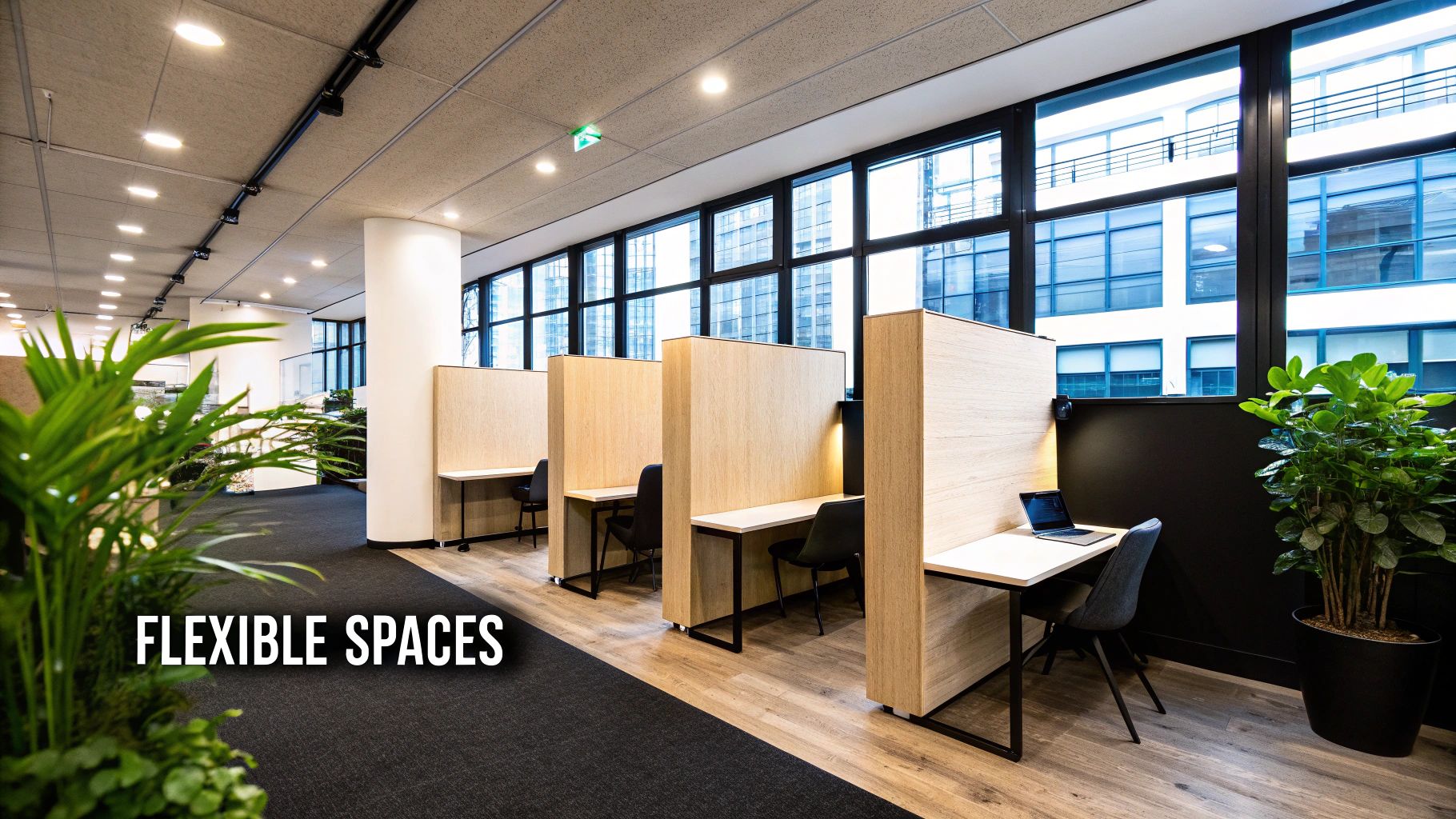The Modern Coworking Space: Beyond Just Desks and Chairs
The modern coworking space has evolved. It's no longer simply a place to set up a laptop. Instead, it's a dynamic environment supporting diverse professionals and their varied work styles. This shift is largely due to the changing nature of work itself, with the rise of remote and hybrid models. Independent creatives, small business owners, and even corporate teams are discovering the benefits of coworking spaces. These spaces offer a unique blend of flexibility, community, and essential resources.
More Than Just Shared Desks: The Key Elements
What distinguishes a true coworking space from a busy coffee shop? Community building is a key differentiator. Many spaces organize networking events, workshops, and social gatherings, fostering a sense of connection among members. This can be especially valuable for solopreneurs or remote workers who may otherwise experience isolation. The design and layout also play a critical role. Modern coworking spaces often incorporate dedicated quiet zones, collaborative work areas, and private offices to accommodate different work preferences and needs.
The Rise of Specialized Spaces
Another defining characteristic is the increasing specialization within the coworking sector. Spaces are now being designed to cater to specific industries or professional niches. For instance, some coworking spaces focus on tech startups, while others cater to creative professionals or those in the wellness industry. This specialization allows for more focused networking and resource sharing. This, in turn, fosters deeper connections and collaborations within these specific communities. It represents a move away from a one-size-fits-all model towards more tailored workspace solutions.
This growing sector is also experiencing significant financial growth. The global coworking space market is expected to reach $51.42 billion by 2029. This represents a compound annual growth rate of 18.4% from its $23.35 billion valuation in 2024. Several factors contribute to this expansion, including the growing popularity of hybrid work cultures, the global expansion of businesses, and the increasing use of these flexible spaces by corporations. You can find more detailed statistics here: Learn more about the coworking market expansion.
The Intangible Value of Coworking
Beyond the tangible amenities and practical benefits, modern coworking spaces offer intangible value. They provide structure and routine for remote workers, a professional setting for client meetings, and opportunities to connect with potential collaborators. This combination of factors can lead to increased productivity, professional growth, and a better work-life balance. It reinforces the concept that coworking spaces are more than just a place to work; they are hubs for professional and personal development.
Transformative Benefits of Coworking Spaces for Professionals

Coworking spaces offer more than just aesthetically pleasing work environments. They provide a range of benefits that can significantly impact professional success. These spaces are changing how people work, fostering dynamic communities, and creating new opportunities for businesses of all sizes.
Boosting Productivity and Collaboration
One of the most significant advantages of a coworking space is the boost it can give to productivity. Escaping the distractions of a home office allows professionals to focus. This is particularly beneficial for those who find it difficult to maintain a healthy work-life balance when their home doubles as their workplace.
Additionally, coworking spaces facilitate organic collaboration. The shared environment naturally encourages interaction and creates opportunities for professionals from different fields to connect. This can lead to unexpected partnerships and innovative projects.
Networking and Business Growth
Coworking spaces are also excellent environments for networking and business growth. They provide a built-in network of potential clients, collaborators, and mentors. For example, a freelancer working in a coworking space might connect with a potential client during a casual conversation.
This type of organic networking can lead to valuable business opportunities. Furthermore, many coworking spaces host networking events and workshops, further expanding members' professional circles. You might be interested in: How to master…
Psychological and Financial Advantages
Beyond the tangible benefits, coworking spaces offer important psychological advantages. They combat the isolation that can sometimes accompany remote work, providing a sense of community. This can be particularly important for individuals who thrive in social settings.
Coworking spaces also help professionals establish healthy work-life boundaries. By having a dedicated workspace outside of their home, they can better separate work and personal time. Financially, coworking spaces can be a cost-effective solution, particularly for startups and small businesses. They eliminate the high overhead costs of traditional office leases.
Maximizing The Coworking Experience: Data-Driven Insights
The following data chart visualizes the key reasons professionals choose coworking spaces:
| Feature/Benefit | Coworking Space | Traditional Office | Home Office |
|---|---|---|---|
| Networking Opportunities | High | Medium | Low |
| Collaboration Potential | High | Medium | Low |
| Cost-Effectiveness | High | Low | Medium |
| Flexibility & Convenience | High | Low | Medium |
| Amenities & Resources | High | Medium | Low |
| Community & Social Interaction | High | Medium | Low |
| Productivity & Focus | Medium | High | Low |
| Work-Life Balance | High | Medium | Low |
| Professional Image | High | High | Low |
This table compares different workspace options, highlighting the unique benefits of coworking spaces. Coworking provides a blend of networking, collaboration, flexibility, and community, often exceeding the benefits of traditional or home office setups.
The data chart below further illustrates the key benefits professionals seek in a coworking space:
| Benefit | Percentage |
|---|---|
| Networking | 42% |
| Increased Productivity | 38% |
| Flexibility | 35% |
| Community | 32% |
| Cost-Effectiveness | 28% |
This bar chart highlights that networking and increased productivity are the top motivators for professionals. While cost-effectiveness is a factor, the professional and social benefits are highly valued. This underscores that coworking spaces are more than just shared offices. They are vibrant hubs for professional development and personal growth.
The Suburban Coworking Revolution Changing Work Patterns

The coworking landscape is experiencing a significant shift. Suburban coworking spaces are on the rise, reflecting a growing demand for better work-life integration. Professionals are seeking productive work environments without the burden of long commutes. This trend is changing how and where we work, fostering dynamic professional hubs outside traditional city centers.
The Rise of Suburban Coworking Hubs
Suburban coworking spaces are flourishing by catering to the unique needs of professionals living outside urban areas. They often offer a different atmosphere and amenities compared to their city counterparts. For instance, some suburban locations provide childcare facilities, a significant draw for working parents. This is a key factor contributing to their popularity in suburban communities.
Suburban coworking hubs also contribute to local economic revitalization. They attract businesses and professionals, stimulating growth and fostering a sense of community. This localized approach to professional development sets suburban coworking apart from the often-anonymous feel of larger urban spaces.
Redefining Work Patterns for a Better Balance
Many professionals are discovering that local coworking spaces offer an ideal balance between productivity and personal life. This enables a more sustainable work rhythm, reducing stress and improving overall well-being. Maintaining productivity, however, remains a key concern for those transitioning to coworking. For helpful insights on adapting to new work patterns, check out this leadership blog.
The coworking space industry has experienced substantial growth, especially in suburban areas. As of early 2025, the rise of suburban locations continues, driven by increasing demand from remote and hybrid workers. This reflects the sector's adaptability to evolving work cultures, particularly post-pandemic. Learn more about coworking space trends. You might also be interested in: Read also: Our sitemap.
Designing Spaces to Serve Local Communities
Suburban coworking spaces are often designed with the specific needs of their communities in mind. They may offer amenities like on-site gyms, outdoor work areas, or shared kitchens. This focus on community-specific design distinguishes them from more generic urban spaces.
These spaces often cultivate a stronger sense of community than larger, more impersonal urban coworking environments. They become hubs for local professionals to connect, collaborate, and support one another. This focus on community building enhances the appeal and long-term success of suburban coworking.
Finding Your Coworking Tribe: Specialized Spaces on the Rise

The coworking landscape is changing. It's no longer just about generalist spaces. A new wave of specialized coworking spaces is emerging, designed to meet the unique needs of different professionals. This shift reflects a growing understanding that diverse industries and work styles thrive in tailored environments. Finding the right coworking space isn't just about an available desk; it's about finding a community aligned with your professional goals.
Industry-Focused Hubs: Connecting With Like-Minded Professionals
A significant aspect of this specialization is the rise of industry-focused hubs. These spaces cater to specific sectors, such as technology, creative fields, or wellness. A coworking space for tech startups, for instance, might offer specialized equipment, relevant software, or industry-specific mentorship programs. Similarly, a space for artists might provide studio facilities, shared equipment, and exhibition opportunities.
This targeted approach fosters stronger connections and facilitates more efficient resource sharing within the community. It creates a synergistic environment where professionals can learn from each other and collaborate on projects.
Beyond Industry: Niche Spaces Catering to Specific Needs
Specialization isn't limited to industry. We're also seeing growth in niche coworking spaces catering to specific professional needs or demographics. These might include spaces for female entrepreneurs, professionals seeking luxury amenities, or those requiring family-friendly work environments.
Niche spaces often provide tailored resources and support. A family-friendly space might offer childcare facilities, while a luxury space could provide premium services like concierge assistance or on-site wellness options. This trend highlights the growing demand for coworking environments that offer more than just a workspace; they are becoming holistic professional hubs.
Finding Your Perfect Match: A Closer Look at Specialized Spaces
To help you find the perfect coworking space, the following table breaks down different types, highlighting their unique features and target members.
Specialized Coworking Spaces: Finding Your Perfect Match
This table breaks down different types of coworking spaces, their distinctive features, and which professionals they best serve
| Coworking Space Type | Key Amenities | Target Members | Typical Price Range |
|---|---|---|---|
| Industry-Specific (e.g., Tech, Creative) | Specialized equipment, industry mentorship, networking events | Startups, freelancers, small businesses within a specific industry | $$ – $$$ |
| Luxury | Premium services, high-end design, exclusive networking opportunities | Established businesses, executives, high-net-worth individuals | $$$$ |
| Wellness-Focused | Yoga studios, healthy food options, meditation rooms | Wellness professionals, individuals prioritizing well-being | $$ – $$$ |
| Women-Focused | Childcare, networking events for women, mentorship programs | Female entrepreneurs, freelancers, professionals | $$ – $$$ |
| Family-Friendly | Childcare, play areas, family-oriented events | Working parents, freelancers with children | $$ – $$$ |
As the table shows, the range of specialized coworking spaces is diverse. The varying amenities and target audiences allow professionals to choose a space that truly aligns with their individual needs and work style. Choosing the right space can significantly impact professional success.
Leveraging Specialized Communities for Accelerated Growth
Specialized coworking spaces offer distinct advantages. They provide access to targeted resources, a built-in network of like-minded individuals, and a sense of community that general coworking spaces often lack. This fosters collaboration and accelerates professional development. Furthermore, being surrounded by peers in your industry or niche can lead to valuable learning opportunities, mentorship, and potential partnerships. This creates a dynamic and supportive environment, going beyond the traditional office. By understanding the specific needs of their members, these specialized spaces provide resources and support that drive success.
Coworking's Global Expansion: New Markets, New Opportunities
The coworking movement is experiencing rapid growth, extending its reach beyond major city centers and transforming professional landscapes in unexpected locations. This global expansion presents exciting opportunities for both coworking space users and operators, reflecting a shift in how and where we work, driven by remote work, the gig economy, and the increasing importance of work-life balance.
Emerging Markets and Second-Tier Cities: Hotspots for Coworking
Coworking spaces are thriving in emerging markets and second-tier cities. These locations often lack the traditional office spaces found in larger cities, making flexible workspaces a compelling alternative. In rapidly developing economies across Asia and Africa, coworking provides entrepreneurs and small businesses with professional environments and essential resources. This fosters local economic development and encourages innovation. Additionally, second-tier cities in developed countries are witnessing a surge in coworking as professionals seek alternatives to long commutes and high living costs.
Adapting to Local Business Cultures While Maintaining Professional Standards
As coworking expands globally, spaces are adapting to local business cultures while maintaining consistent professional standards. This requires a nuanced understanding of each region. For example, some cultures may place a greater emphasis on formal business practices, which can influence the design and operation of a coworking space. However, the core values of coworking—flexibility, community, and collaboration—remain constant. This allows spaces to cater to global businesses and remote teams while respecting local customs. This adaptability is essential for successful coworking in diverse markets.
Distributed Teams and Global Networks
The global expansion of coworking is beneficial for distributed teams. Companies can now establish a presence in new markets without the significant financial burden of traditional office leases. This flexibility allows businesses to scale quickly and efficiently, capitalizing on market opportunities with greater agility. Coworking spaces offer ready-made infrastructure and professional settings for remote team members, promoting collaboration and productivity. This empowers businesses to operate seamlessly across borders, access global talent pools, and expand their market reach.
Economic Development and Untapped Potential
Coworking spaces can be powerful catalysts for economic development, especially in underserved areas. By providing resources and infrastructure, they empower entrepreneurs, startups, and small businesses. This, in turn, can create jobs, stimulate local economies, and drive innovation. For both coworking space users and potential operators, identifying markets with untapped potential is crucial. Key factors to consider include demographic trends, economic growth, and the presence of a dynamic entrepreneurial community. The year 2025 saw substantial growth in the coworking sector, impacting both major markets and emerging regions. By the end of Q1 2025, the United States had 7,840 coworking spaces, a net increase of 145 spaces year-over-year. Growth was particularly strong in previously underrepresented areas like Southwest Florida, Brooklyn, NY, and San Antonio, with increases of 10%, 8%, and 7% respectively. These gains highlight the industry's expansion into diverse geographic locations, driven by the increasing demand for flexible workspaces. More detailed statistics are available here.
Identifying Opportunities for Growth
The continued global expansion of coworking presents significant opportunities. For entrepreneurs and businesses, it offers flexible and cost-effective work solutions in an expanding number of locations. For investors and operators, it represents a chance to enter new markets and contribute to the evolution of work. As the future of work becomes increasingly decentralized and globalized, coworking spaces are poised to play a vital role in shaping professional communities worldwide. This continued growth signifies the evolving demands of the modern workplace and a shift towards flexible and collaborative work environments.
Selecting the Perfect Coworking Space: A Strategic Approach
Finding the right coworking space takes more than a simple online search. It requires a strategic approach to ensure the space aligns with your specific professional needs and goals. Choosing wisely can significantly impact your productivity, networking opportunities, and overall work experience.
Defining Your Needs and Priorities
Start by identifying your must-haves. What are your non-negotiables in a workspace? Consider factors like location and accessibility. Is it easily accessible by public transport or do you need ample parking?
Think about your work style. Do you thrive in a bustling environment or prefer a quiet space for focused work? Understanding your preferences will help narrow down your choices.
Essential Amenities and Infrastructure
Assess the technological infrastructure. Is the internet reliable and fast enough? Are there sufficient power outlets and printing facilities?
Consider the availability of meeting rooms and other essential amenities. Do they offer flexible booking options and have the necessary technology? These practical aspects are crucial for a productive work environment. When considering your budget, be sure to understand coworking space cost.
The Importance of Community and Culture
The community aspect of a coworking space is often overlooked, but it’s important. What is the overall vibe of the space? Does it feel collaborative and supportive?
Look for opportunities to connect with other members. Are there regular networking events or social gatherings? A strong community can provide valuable connections and a sense of belonging.
Key Questions to Ask During a Tour
Don’t hesitate to ask specific questions during tours. Inquire about the membership options and terms. What kind of flexibility is offered regarding contract length and desk availability?
Ask about security measures and after-hours access. These details can affect your day-to-day experience.
Red Flags and Potential Dealbreakers
Be aware of potential red flags. A lack of transparency about pricing or membership terms is a warning sign. A poorly maintained space or unresponsive staff can also indicate underlying issues.
Trust your instincts. If something doesn't feel right, it's best to move on. You might be interested in: Learn more in our article about…
Testing the Waters: Day Passes and Trial Periods
The best way to evaluate a coworking space is to experience it firsthand. Many spaces offer day passes or short-term trial periods. Use these opportunities to get a feel for the space and its community.
Observe the noise levels, internet speed, and overall atmosphere. This gives you valuable insights into what it’s like to work there regularly. As reported by Savills, flexible office spaces offer shorter lease terms and scalable options. This allows businesses to avoid long-term commitments and make decisions aligned with their goals.
Success Stories: Finding the Right Fit
Different professionals have different needs. A solo entrepreneur might prioritize a flexible, cost-effective space, while a distributed team may require private offices and dedicated meeting rooms. Research how others have found their ideal coworking space. Learning from their experiences can inform your decision.
Finding the perfect coworking space is an investment in your professional success. By taking a strategic approach, you can find a space that enhances your productivity, expands your network, and supports your career growth. Check out Seat Leasing BPO for flexible workspace solutions designed to help your business thrive.




